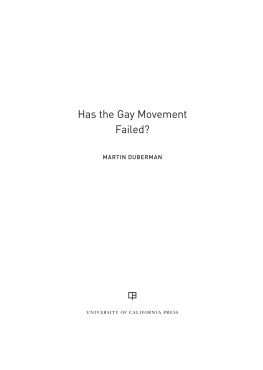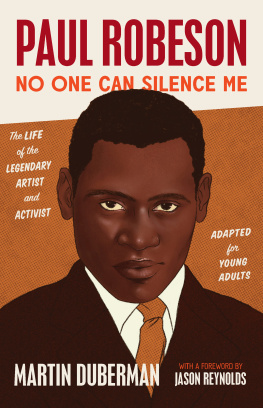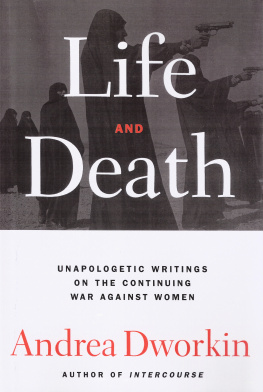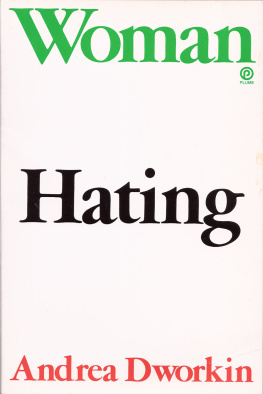
ANDREA DWORKIN
ALSO BY MARTIN DUBERMAN
NONFICTION
Naomi Weisstein: Brain Scientist, Rock Band Leader,
Feminist Rebel. Her Collected Essays
Has the Gay Movement Failed?
The Rest of It: Hustlers, Cocaine, Depression, and Then Some, 19761988
The Emperor Has No Clothes: Doug Irelands Radical Voice (editor)
The Martin Duberman Reader
Hold Tight Gently: Michael Callen, Essex Hemphill, and the Battlefield of AIDS
Howard Zinn: A Life on the Left
A Saving Remnant: The Radical Lives of Barbara Deming and David McReynolds
Waiting to Land: A (Mostly) Political Memoir
The Worlds of Lincoln Kirstein
Left Out: The Politics of Exclusion: Essays 19642002
Queer Representations (editor)
A Queer World (editor)
Midlife Queer: Autobiography of a Decade, 19711981
Stonewall
Cures: A Gay Mans Odyssey
Hidden from History: Reclaiming the Gay and Lesbian Past (co-editor)
Paul Robeson: A Biography
About Time: Exploring the Gay Past
Black Mountain: An Exploration in Community
The Uncompleted Past
James Russell Lowell
The Antislavery Vanguard (editor)
Charles Francis Adams, 18071886
DRAMA
Radical Acts
Male Armor: Selected Plays, 19681974
The Memory Bank
FICTION
Luminous Traitor
Jews/Queers/Germans
Haymarket
ANDREA DWORKIN
The Feminist as Revolutionary
Martin Duberman
To Andreas dream of a gender-just world
Imagine: We are linked, not ranked.
Gloria Steinem (2013)
Contents
Beginnings
A ndreas ordeal began on a bitterly cold day in February 1965, when by pre-arrangement she joined a sit-in at the U.S. Mission to the United Nations to protest the escalating U.S. involvement in Vietnam. At the time Andrea was eighteen, a freshman at Bennington College on a nine-week work break; already a committed leftist serving as a volunteer at the Student Peace Union, shed helped the War Resisters League organize the anti-war protest. Expecting to be arrested, Andrea brought along to the sit-in some toilet articles and an extra pair of underwear. As she later remembered it, this funny, nice little woman kept going up and down the line of protesters, checking to see that they were all right and asking if she could do anything for them. It was Grace Paley, the well-known writer. As it grew late and an arrest seemed unlikely, Andrea asked Grace to hold on to the extra things shed brought along, saying she would pick them up in a few hours.
Minutes later, the police suddenly descended, and Andrea was among those carted off to night court. Her legal-aid attorney tried to persuade the presiding judge to free her on her own recognizance, arguing that she posed no danger to society during the period that would precede sentencing. The judge rejected the plea, fixed bail at $500 and, when Andrea said she couldnt pay, remanded her to the notorious bastille in the heart of Greenwich Village known as the Womens House of Detention.
After being showered and searched, she was subjected to a vaginal exam by a prison nurse, then taken up to her cell and locked in. The following afternoon she was brought back to the examination room for another inspection; when an alarmed Andrea asked a policewoman why, the reply was another question: Are you a virgin? Andrea refused to answer. At that point two male doctors entered the room, one explaining loudly to the other that he suspected venereal disease. Andrea was ordered onto the table and told to put her legs in the stirrups. While the one doctor stood by, the other applied pressure initially to Andreas stomach and then to her breast. Youre hurting me, Andrea protested. Ignoring her, he put on a rubber glove and inserted his hand first into her rectum, then into her vagina. Removing his hand, he explained to the other doctor that he would now probe further with a speculum. Andrea had never heard the word before.
As the exam proceeded and her pain mounted, the second doctor plied her with questions: How many girls at Bennington are virgins? I dont know, Andrea said. How many freshmen at Bennington are virgins? I dont know, Andrea said, as the pain from the forceps grew worse. Thats what you should know about, he barked, not Vietnam. When Andrea started to bleedit would continue for the next two weeksthe doctor withdrew the forceps and ordered her back to the cell block. On the way, Andrea asked the accompanying policewoman if she could make a phone call. Its Friday, the officer said. No calls are allowed on weekends. Monday is George Washingtons birthday. You can call on Tuesday.
Released within a few days, Andrea decided to write to every newspaper listed in the Yellow Pages describing conditions at the House of Detention (built to house 400, it currently held 657 inmates) and her own mistreatment there. Somewhat hesitantly she called her parents, fairly certain theyd be appalled at her defiance. She guessed right; her mother Sylvia, in particular, was horrified at the pending disgrace. Rather than remain at home, subject to her mothers admonitions, and remembering Grace Paleys name,
The widely read New York Post columnist James Wechsler was among the first to respond to Andreas letter. He found the young womans story so arresting that he decided to take down her words in the form of a sworn affidavit. Wechslerlong a prominent voice in liberal political circleslistened with mounting anger to the eighteen-year-old as she related, with passionate intensity, her horrendous tale of mistreatment. After receiving her sworn affidavit, Wechsler published the first of his two columns, calling for a full-scale inquiry, preferably by a commission of independent citizens designated by the Mayor or the Governor. The original sin, he added, rests with the self-righteous judge who sent these girls into that horror house for what was essentially a crime of conscience. The truth is that the Womens House is an unfit habitation for any human soul. A sweeping exploration of this case might finally hasten its end.
The mayor of New York City at the time was Robert Wagner, a man (as Wechsler described him) of studied inactions, though essentially honest [and] humane. Running true to form, Wagnera full four days after Andreas releasehad still not made a single comment to the press nor signaled any intention of ordering an official inquiry. When pressed, the Mayors Office let it be known that he is patiently waiting for a report from Corrections Commissioner Anna Kross (who had in fact long since condemned conditions at the Womens House of Detention). Governor Nelson Rockefellers office, in turn, reminded reporters that a new building for female prisoners was already on the drawing board, the implication being that it would be redundant to bother correcting the state of affairs at the old one.
To appease a mounting public outcrya Committee of Outraged
Though only eighteen, Andrea was already savvy enough to know that fine words are no guarantee of fine deeds, and she continued to press her own case; she gave testimony before the grand jury, and she wrote directly to Corrections Commissioner Anna Kross reiterating the injurious treatment shed suffered. Kross was sympathetic. She told one reporter that shed never held a brief for that place, and pressured the (female) superintendent of the House of Detention for a full accounting. The superintendent reported back that complete physical exams were conducted routinely and always with the greatest dignity and decorum.
Next page












